Reflective Learning: Improving Future Formative Assessments
VerifiedAdded on 2023/06/11
|7
|1773
|462
Essay
AI Summary
This essay discusses the importance of reflective learning in higher education, focusing on how a reflective approach to feedback and feed-forward can improve future formative assessments. It highlights the Gibbs reflective cycle, detailing its six stages: description, feelings, evaluation, analysis, conclusion, and action plan. The essay emphasizes the role of feedback in evaluating current performance and feed-forward in providing constructive guidance for future improvement. It also explores methods for facilitating improvement in both formative and summative assessments, noting the importance of feedback in motivating students and enhancing their skills. The essay concludes that reflective learning is a crucial technique for students to gain effective learning methods by determining their strengths and weaknesses, ultimately aiding in their academic and professional development. Desklib provides access to similar essays and study resources for students.
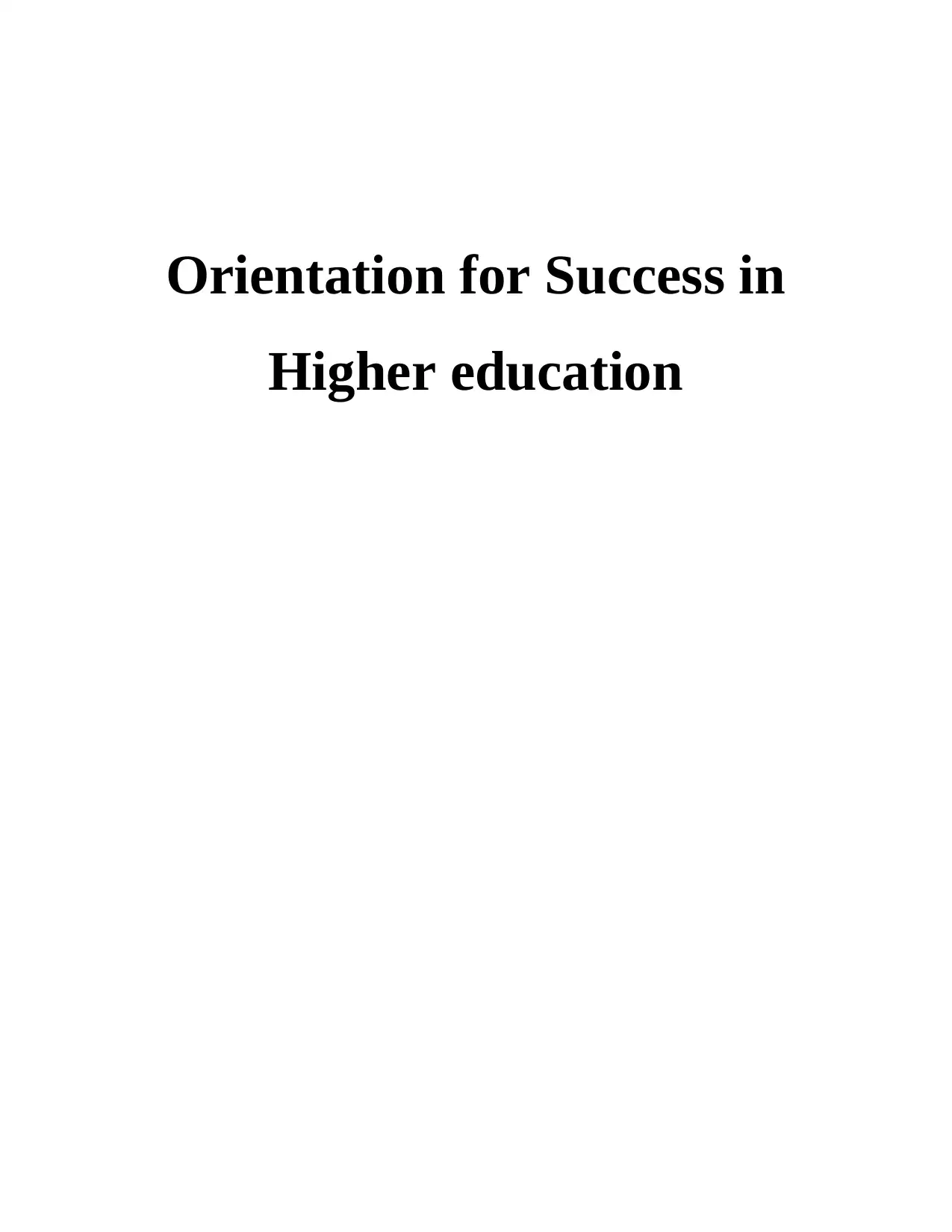
Orientation for Success in
Higher education
Higher education
Paraphrase This Document
Need a fresh take? Get an instant paraphrase of this document with our AI Paraphraser
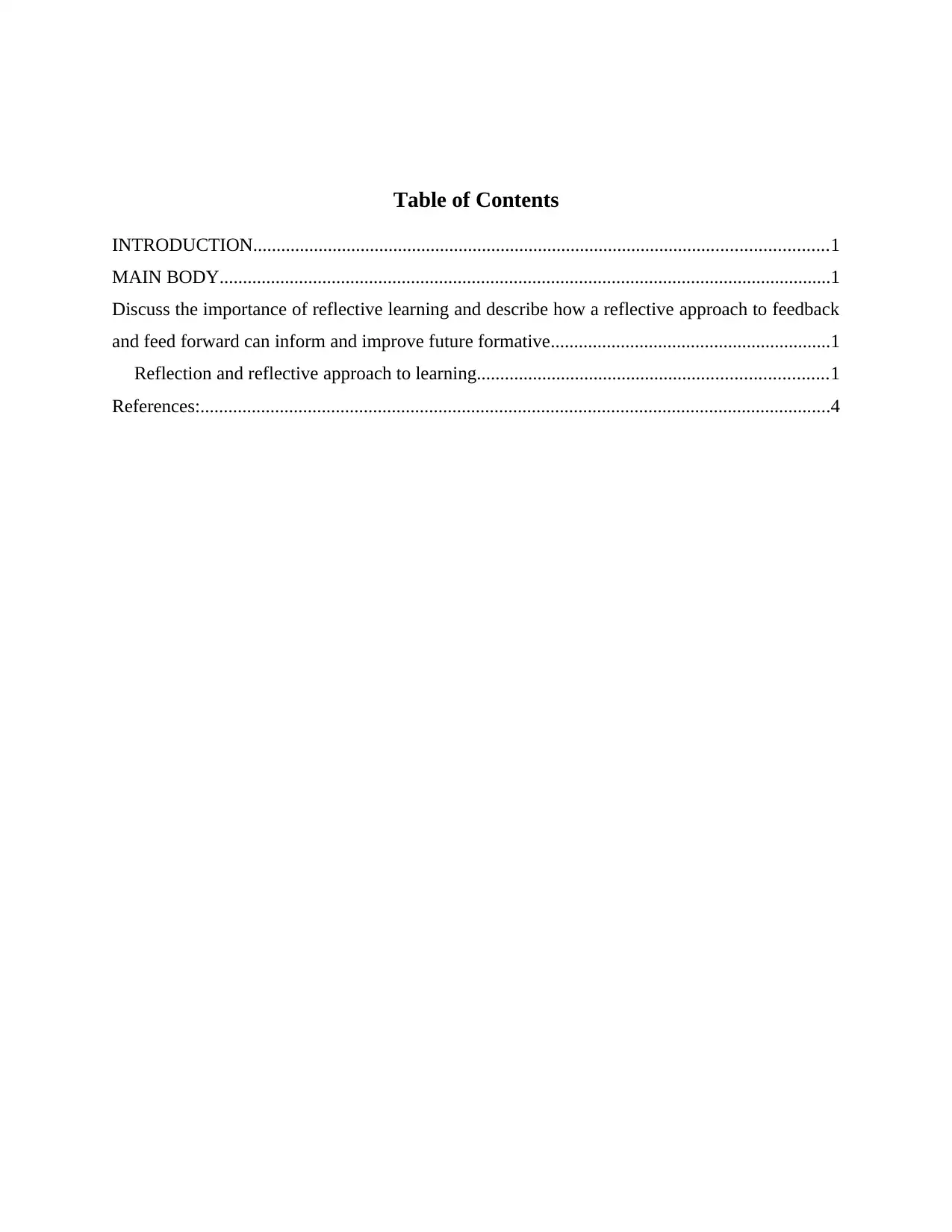
Table of Contents
INTRODUCTION...........................................................................................................................1
MAIN BODY...................................................................................................................................1
Discuss the importance of reflective learning and describe how a reflective approach to feedback
and feed forward can inform and improve future formative............................................................1
Reflection and reflective approach to learning...........................................................................1
References:.......................................................................................................................................4
INTRODUCTION...........................................................................................................................1
MAIN BODY...................................................................................................................................1
Discuss the importance of reflective learning and describe how a reflective approach to feedback
and feed forward can inform and improve future formative............................................................1
Reflection and reflective approach to learning...........................................................................1
References:.......................................................................................................................................4
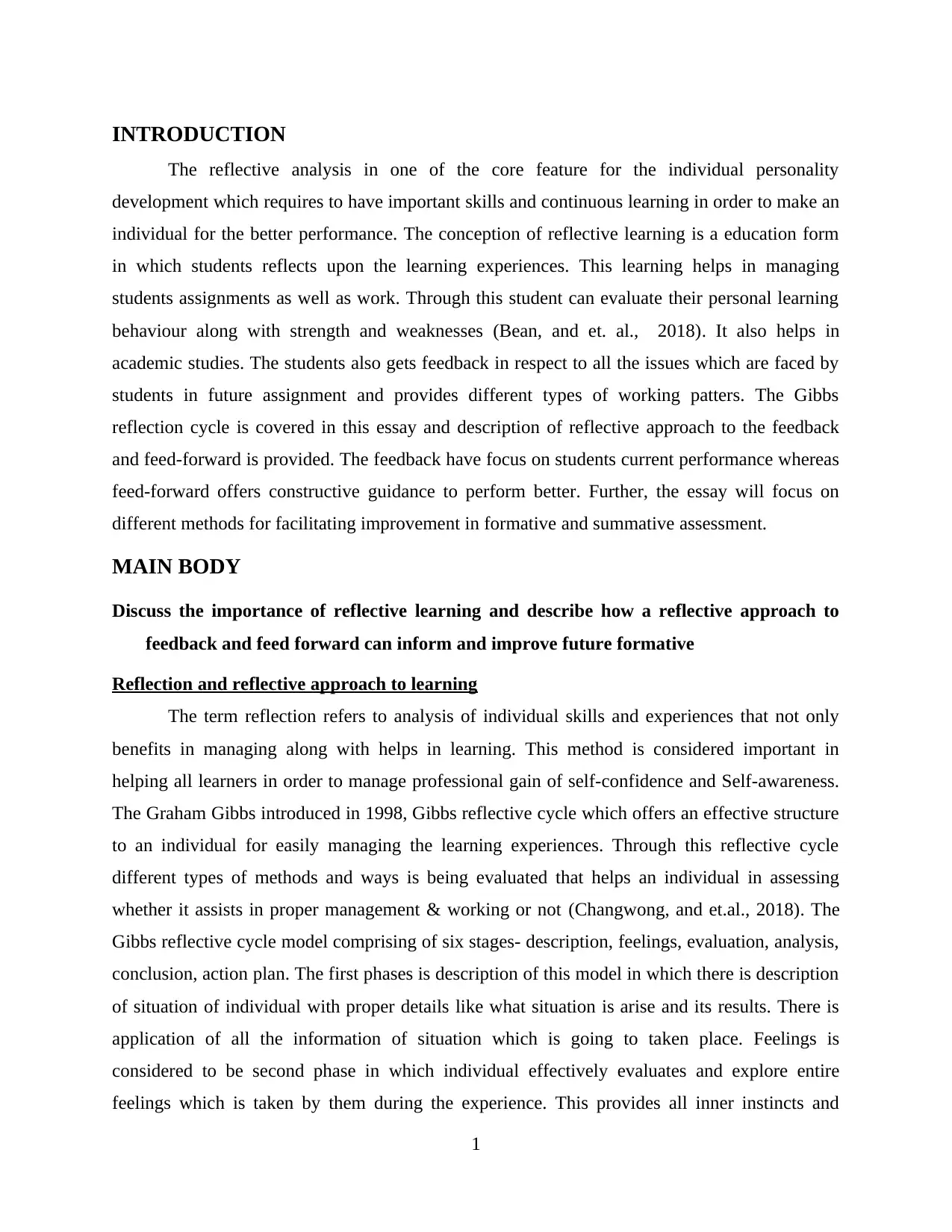
INTRODUCTION
The reflective analysis in one of the core feature for the individual personality
development which requires to have important skills and continuous learning in order to make an
individual for the better performance. The conception of reflective learning is a education form
in which students reflects upon the learning experiences. This learning helps in managing
students assignments as well as work. Through this student can evaluate their personal learning
behaviour along with strength and weaknesses (Bean, and et. al., 2018). It also helps in
academic studies. The students also gets feedback in respect to all the issues which are faced by
students in future assignment and provides different types of working patters. The Gibbs
reflection cycle is covered in this essay and description of reflective approach to the feedback
and feed-forward is provided. The feedback have focus on students current performance whereas
feed-forward offers constructive guidance to perform better. Further, the essay will focus on
different methods for facilitating improvement in formative and summative assessment.
MAIN BODY
Discuss the importance of reflective learning and describe how a reflective approach to
feedback and feed forward can inform and improve future formative
Reflection and reflective approach to learning
The term reflection refers to analysis of individual skills and experiences that not only
benefits in managing along with helps in learning. This method is considered important in
helping all learners in order to manage professional gain of self-confidence and Self-awareness.
The Graham Gibbs introduced in 1998, Gibbs reflective cycle which offers an effective structure
to an individual for easily managing the learning experiences. Through this reflective cycle
different types of methods and ways is being evaluated that helps an individual in assessing
whether it assists in proper management & working or not (Changwong, and et.al., 2018). The
Gibbs reflective cycle model comprising of six stages- description, feelings, evaluation, analysis,
conclusion, action plan. The first phases is description of this model in which there is description
of situation of individual with proper details like what situation is arise and its results. There is
application of all the information of situation which is going to taken place. Feelings is
considered to be second phase in which individual effectively evaluates and explore entire
feelings which is taken by them during the experience. This provides all inner instincts and
1
The reflective analysis in one of the core feature for the individual personality
development which requires to have important skills and continuous learning in order to make an
individual for the better performance. The conception of reflective learning is a education form
in which students reflects upon the learning experiences. This learning helps in managing
students assignments as well as work. Through this student can evaluate their personal learning
behaviour along with strength and weaknesses (Bean, and et. al., 2018). It also helps in
academic studies. The students also gets feedback in respect to all the issues which are faced by
students in future assignment and provides different types of working patters. The Gibbs
reflection cycle is covered in this essay and description of reflective approach to the feedback
and feed-forward is provided. The feedback have focus on students current performance whereas
feed-forward offers constructive guidance to perform better. Further, the essay will focus on
different methods for facilitating improvement in formative and summative assessment.
MAIN BODY
Discuss the importance of reflective learning and describe how a reflective approach to
feedback and feed forward can inform and improve future formative
Reflection and reflective approach to learning
The term reflection refers to analysis of individual skills and experiences that not only
benefits in managing along with helps in learning. This method is considered important in
helping all learners in order to manage professional gain of self-confidence and Self-awareness.
The Graham Gibbs introduced in 1998, Gibbs reflective cycle which offers an effective structure
to an individual for easily managing the learning experiences. Through this reflective cycle
different types of methods and ways is being evaluated that helps an individual in assessing
whether it assists in proper management & working or not (Changwong, and et.al., 2018). The
Gibbs reflective cycle model comprising of six stages- description, feelings, evaluation, analysis,
conclusion, action plan. The first phases is description of this model in which there is description
of situation of individual with proper details like what situation is arise and its results. There is
application of all the information of situation which is going to taken place. Feelings is
considered to be second phase in which individual effectively evaluates and explore entire
feelings which is taken by them during the experience. This provides all inner instincts and
1
⊘ This is a preview!⊘
Do you want full access?
Subscribe today to unlock all pages.

Trusted by 1+ million students worldwide
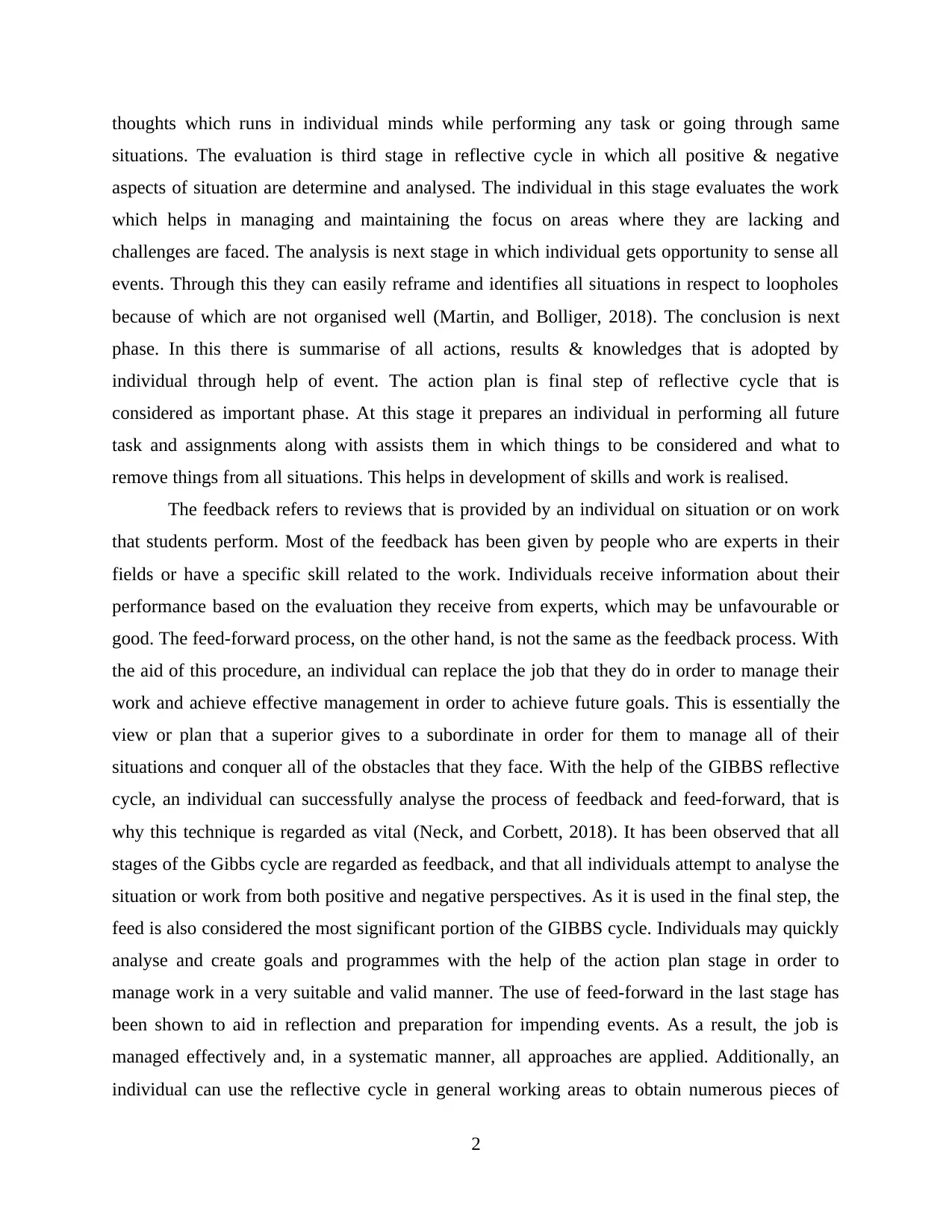
thoughts which runs in individual minds while performing any task or going through same
situations. The evaluation is third stage in reflective cycle in which all positive & negative
aspects of situation are determine and analysed. The individual in this stage evaluates the work
which helps in managing and maintaining the focus on areas where they are lacking and
challenges are faced. The analysis is next stage in which individual gets opportunity to sense all
events. Through this they can easily reframe and identifies all situations in respect to loopholes
because of which are not organised well (Martin, and Bolliger, 2018). The conclusion is next
phase. In this there is summarise of all actions, results & knowledges that is adopted by
individual through help of event. The action plan is final step of reflective cycle that is
considered as important phase. At this stage it prepares an individual in performing all future
task and assignments along with assists them in which things to be considered and what to
remove things from all situations. This helps in development of skills and work is realised.
The feedback refers to reviews that is provided by an individual on situation or on work
that students perform. Most of the feedback has been given by people who are experts in their
fields or have a specific skill related to the work. Individuals receive information about their
performance based on the evaluation they receive from experts, which may be unfavourable or
good. The feed-forward process, on the other hand, is not the same as the feedback process. With
the aid of this procedure, an individual can replace the job that they do in order to manage their
work and achieve effective management in order to achieve future goals. This is essentially the
view or plan that a superior gives to a subordinate in order for them to manage all of their
situations and conquer all of the obstacles that they face. With the help of the GIBBS reflective
cycle, an individual can successfully analyse the process of feedback and feed-forward, that is
why this technique is regarded as vital (Neck, and Corbett, 2018). It has been observed that all
stages of the Gibbs cycle are regarded as feedback, and that all individuals attempt to analyse the
situation or work from both positive and negative perspectives. As it is used in the final step, the
feed is also considered the most significant portion of the GIBBS cycle. Individuals may quickly
analyse and create goals and programmes with the help of the action plan stage in order to
manage work in a very suitable and valid manner. The use of feed-forward in the last stage has
been shown to aid in reflection and preparation for impending events. As a result, the job is
managed effectively and, in a systematic manner, all approaches are applied. Additionally, an
individual can use the reflective cycle in general working areas to obtain numerous pieces of
2
situations. The evaluation is third stage in reflective cycle in which all positive & negative
aspects of situation are determine and analysed. The individual in this stage evaluates the work
which helps in managing and maintaining the focus on areas where they are lacking and
challenges are faced. The analysis is next stage in which individual gets opportunity to sense all
events. Through this they can easily reframe and identifies all situations in respect to loopholes
because of which are not organised well (Martin, and Bolliger, 2018). The conclusion is next
phase. In this there is summarise of all actions, results & knowledges that is adopted by
individual through help of event. The action plan is final step of reflective cycle that is
considered as important phase. At this stage it prepares an individual in performing all future
task and assignments along with assists them in which things to be considered and what to
remove things from all situations. This helps in development of skills and work is realised.
The feedback refers to reviews that is provided by an individual on situation or on work
that students perform. Most of the feedback has been given by people who are experts in their
fields or have a specific skill related to the work. Individuals receive information about their
performance based on the evaluation they receive from experts, which may be unfavourable or
good. The feed-forward process, on the other hand, is not the same as the feedback process. With
the aid of this procedure, an individual can replace the job that they do in order to manage their
work and achieve effective management in order to achieve future goals. This is essentially the
view or plan that a superior gives to a subordinate in order for them to manage all of their
situations and conquer all of the obstacles that they face. With the help of the GIBBS reflective
cycle, an individual can successfully analyse the process of feedback and feed-forward, that is
why this technique is regarded as vital (Neck, and Corbett, 2018). It has been observed that all
stages of the Gibbs cycle are regarded as feedback, and that all individuals attempt to analyse the
situation or work from both positive and negative perspectives. As it is used in the final step, the
feed is also considered the most significant portion of the GIBBS cycle. Individuals may quickly
analyse and create goals and programmes with the help of the action plan stage in order to
manage work in a very suitable and valid manner. The use of feed-forward in the last stage has
been shown to aid in reflection and preparation for impending events. As a result, the job is
managed effectively and, in a systematic manner, all approaches are applied. Additionally, an
individual can use the reflective cycle in general working areas to obtain numerous pieces of
2
Paraphrase This Document
Need a fresh take? Get an instant paraphrase of this document with our AI Paraphraser
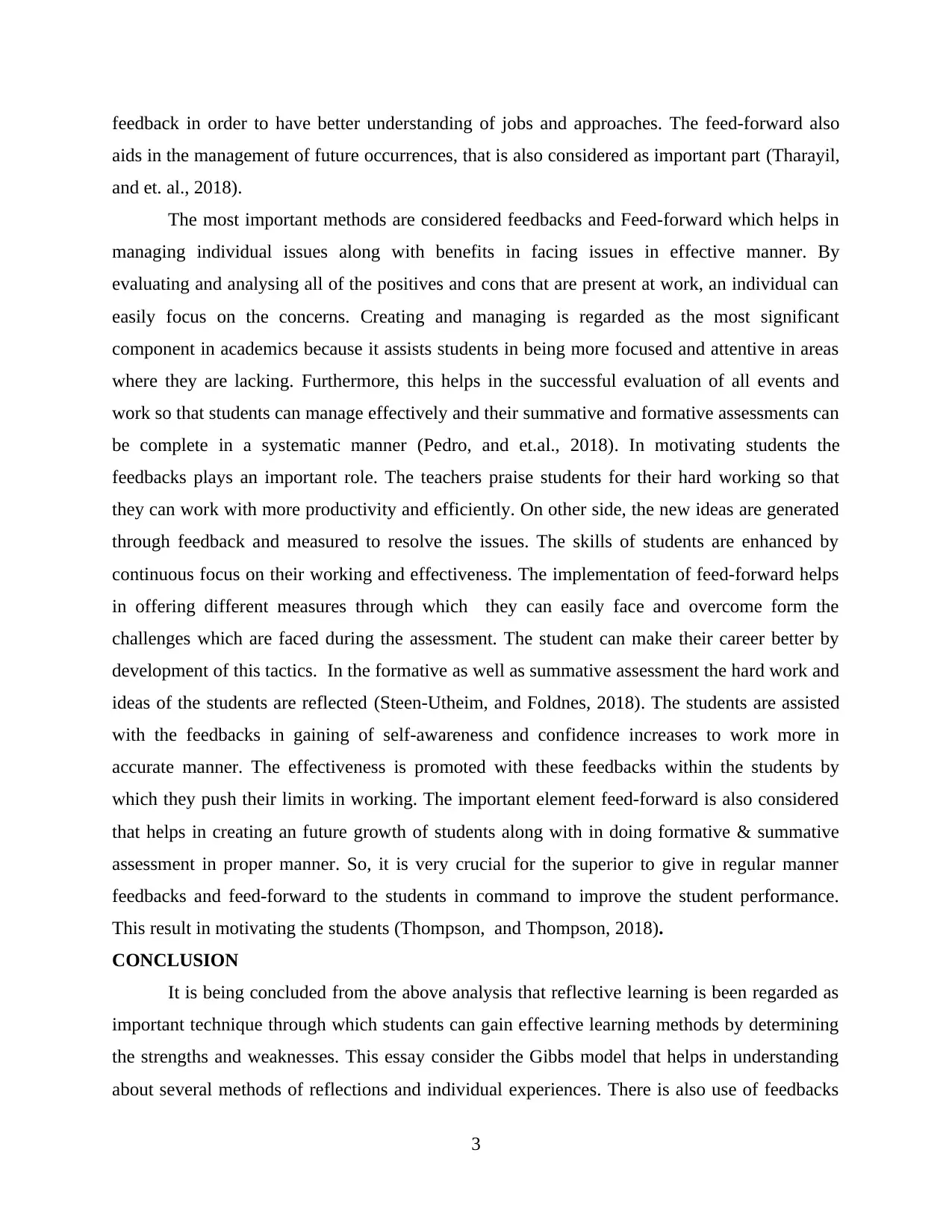
feedback in order to have better understanding of jobs and approaches. The feed-forward also
aids in the management of future occurrences, that is also considered as important part (Tharayil,
and et. al., 2018).
The most important methods are considered feedbacks and Feed-forward which helps in
managing individual issues along with benefits in facing issues in effective manner. By
evaluating and analysing all of the positives and cons that are present at work, an individual can
easily focus on the concerns. Creating and managing is regarded as the most significant
component in academics because it assists students in being more focused and attentive in areas
where they are lacking. Furthermore, this helps in the successful evaluation of all events and
work so that students can manage effectively and their summative and formative assessments can
be complete in a systematic manner (Pedro, and et.al., 2018). In motivating students the
feedbacks plays an important role. The teachers praise students for their hard working so that
they can work with more productivity and efficiently. On other side, the new ideas are generated
through feedback and measured to resolve the issues. The skills of students are enhanced by
continuous focus on their working and effectiveness. The implementation of feed-forward helps
in offering different measures through which they can easily face and overcome form the
challenges which are faced during the assessment. The student can make their career better by
development of this tactics. In the formative as well as summative assessment the hard work and
ideas of the students are reflected (Steen-Utheim, and Foldnes, 2018). The students are assisted
with the feedbacks in gaining of self-awareness and confidence increases to work more in
accurate manner. The effectiveness is promoted with these feedbacks within the students by
which they push their limits in working. The important element feed-forward is also considered
that helps in creating an future growth of students along with in doing formative & summative
assessment in proper manner. So, it is very crucial for the superior to give in regular manner
feedbacks and feed-forward to the students in command to improve the student performance.
This result in motivating the students (Thompson, and Thompson, 2018).
CONCLUSION
It is being concluded from the above analysis that reflective learning is been regarded as
important technique through which students can gain effective learning methods by determining
the strengths and weaknesses. This essay consider the Gibbs model that helps in understanding
about several methods of reflections and individual experiences. There is also use of feedbacks
3
aids in the management of future occurrences, that is also considered as important part (Tharayil,
and et. al., 2018).
The most important methods are considered feedbacks and Feed-forward which helps in
managing individual issues along with benefits in facing issues in effective manner. By
evaluating and analysing all of the positives and cons that are present at work, an individual can
easily focus on the concerns. Creating and managing is regarded as the most significant
component in academics because it assists students in being more focused and attentive in areas
where they are lacking. Furthermore, this helps in the successful evaluation of all events and
work so that students can manage effectively and their summative and formative assessments can
be complete in a systematic manner (Pedro, and et.al., 2018). In motivating students the
feedbacks plays an important role. The teachers praise students for their hard working so that
they can work with more productivity and efficiently. On other side, the new ideas are generated
through feedback and measured to resolve the issues. The skills of students are enhanced by
continuous focus on their working and effectiveness. The implementation of feed-forward helps
in offering different measures through which they can easily face and overcome form the
challenges which are faced during the assessment. The student can make their career better by
development of this tactics. In the formative as well as summative assessment the hard work and
ideas of the students are reflected (Steen-Utheim, and Foldnes, 2018). The students are assisted
with the feedbacks in gaining of self-awareness and confidence increases to work more in
accurate manner. The effectiveness is promoted with these feedbacks within the students by
which they push their limits in working. The important element feed-forward is also considered
that helps in creating an future growth of students along with in doing formative & summative
assessment in proper manner. So, it is very crucial for the superior to give in regular manner
feedbacks and feed-forward to the students in command to improve the student performance.
This result in motivating the students (Thompson, and Thompson, 2018).
CONCLUSION
It is being concluded from the above analysis that reflective learning is been regarded as
important technique through which students can gain effective learning methods by determining
the strengths and weaknesses. This essay consider the Gibbs model that helps in understanding
about several methods of reflections and individual experiences. There is also use of feedbacks
3
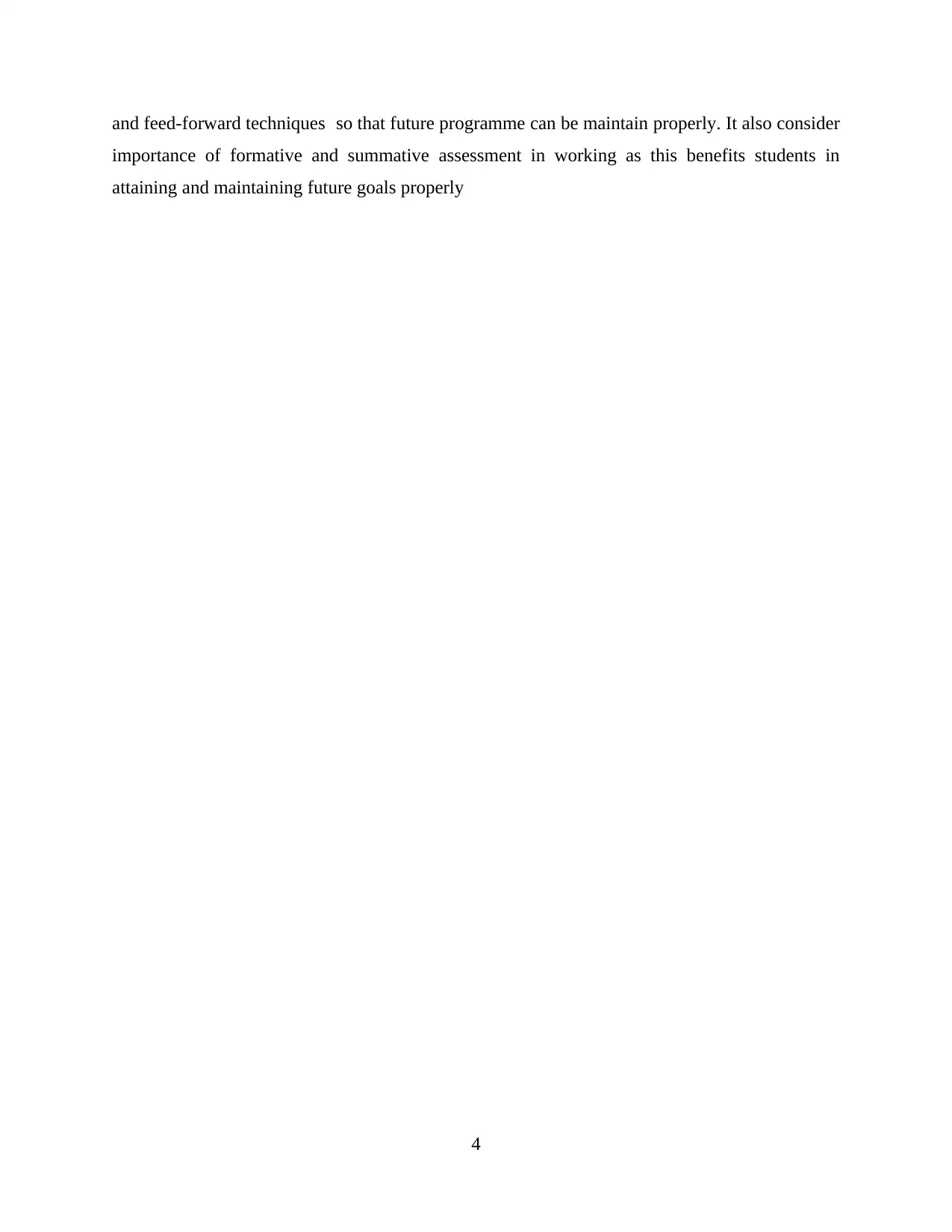
and feed-forward techniques so that future programme can be maintain properly. It also consider
importance of formative and summative assessment in working as this benefits students in
attaining and maintaining future goals properly
4
importance of formative and summative assessment in working as this benefits students in
attaining and maintaining future goals properly
4
⊘ This is a preview!⊘
Do you want full access?
Subscribe today to unlock all pages.

Trusted by 1+ million students worldwide
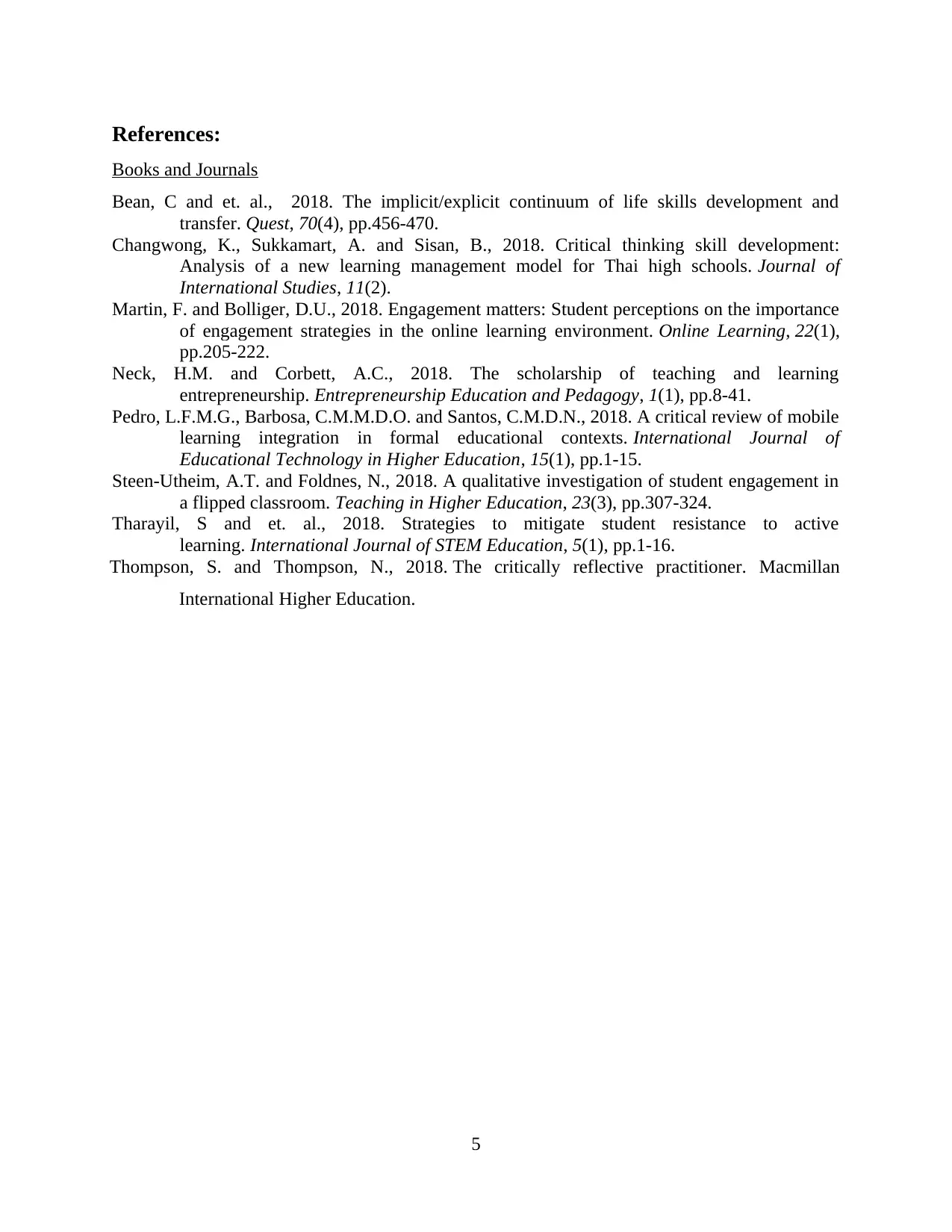
References:
Books and Journals
Bean, C and et. al., 2018. The implicit/explicit continuum of life skills development and
transfer. Quest, 70(4), pp.456-470.
Changwong, K., Sukkamart, A. and Sisan, B., 2018. Critical thinking skill development:
Analysis of a new learning management model for Thai high schools. Journal of
International Studies, 11(2).
Martin, F. and Bolliger, D.U., 2018. Engagement matters: Student perceptions on the importance
of engagement strategies in the online learning environment. Online Learning, 22(1),
pp.205-222.
Neck, H.M. and Corbett, A.C., 2018. The scholarship of teaching and learning
entrepreneurship. Entrepreneurship Education and Pedagogy, 1(1), pp.8-41.
Pedro, L.F.M.G., Barbosa, C.M.M.D.O. and Santos, C.M.D.N., 2018. A critical review of mobile
learning integration in formal educational contexts. International Journal of
Educational Technology in Higher Education, 15(1), pp.1-15.
Steen-Utheim, A.T. and Foldnes, N., 2018. A qualitative investigation of student engagement in
a flipped classroom. Teaching in Higher Education, 23(3), pp.307-324.
Tharayil, S and et. al., 2018. Strategies to mitigate student resistance to active
learning. International Journal of STEM Education, 5(1), pp.1-16.
Thompson, S. and Thompson, N., 2018. The critically reflective practitioner. Macmillan
International Higher Education.
5
Books and Journals
Bean, C and et. al., 2018. The implicit/explicit continuum of life skills development and
transfer. Quest, 70(4), pp.456-470.
Changwong, K., Sukkamart, A. and Sisan, B., 2018. Critical thinking skill development:
Analysis of a new learning management model for Thai high schools. Journal of
International Studies, 11(2).
Martin, F. and Bolliger, D.U., 2018. Engagement matters: Student perceptions on the importance
of engagement strategies in the online learning environment. Online Learning, 22(1),
pp.205-222.
Neck, H.M. and Corbett, A.C., 2018. The scholarship of teaching and learning
entrepreneurship. Entrepreneurship Education and Pedagogy, 1(1), pp.8-41.
Pedro, L.F.M.G., Barbosa, C.M.M.D.O. and Santos, C.M.D.N., 2018. A critical review of mobile
learning integration in formal educational contexts. International Journal of
Educational Technology in Higher Education, 15(1), pp.1-15.
Steen-Utheim, A.T. and Foldnes, N., 2018. A qualitative investigation of student engagement in
a flipped classroom. Teaching in Higher Education, 23(3), pp.307-324.
Tharayil, S and et. al., 2018. Strategies to mitigate student resistance to active
learning. International Journal of STEM Education, 5(1), pp.1-16.
Thompson, S. and Thompson, N., 2018. The critically reflective practitioner. Macmillan
International Higher Education.
5
1 out of 7
Related Documents
Your All-in-One AI-Powered Toolkit for Academic Success.
+13062052269
info@desklib.com
Available 24*7 on WhatsApp / Email
![[object Object]](/_next/static/media/star-bottom.7253800d.svg)
Unlock your academic potential
Copyright © 2020–2026 A2Z Services. All Rights Reserved. Developed and managed by ZUCOL.

